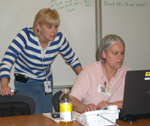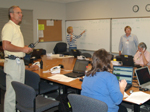Blood donations critically low
MUSC participates in
regional WMD drill
by Mary
Helen YarboroughPublic Relations
It was 6:45 p.m. on a weeknight, and family, friends and students were pouring into Summerville’s McKissick stadium for a football game. Suddenly an explosion went off, part of the stadium collapsed and what was to be a night of fun and sport was filled with horror and confusion, with at least 2,000 casualties. Within moments, incident command centers were established at area hospitals, including MUSC, and the S.C. Department of Health and Environmental Control (DHEC) Region 7 was serving as the central command center for all hospital operations where 14 hospital and emergency response officials assembled for a drill June 12.
 Ann Sports, left,
preparedness and response community liaison for DHEC Region 7, and
MUSC’s Marie Herrin, R.N., monitor developments from the Regional
Healthcare Coordinating Center in North Charleston during a WMD drill
June 12.
Ann Sports, left,
preparedness and response community liaison for DHEC Region 7, and
MUSC’s Marie Herrin, R.N., monitor developments from the Regional
Healthcare Coordinating Center in North Charleston during a WMD drill
June 12.MUSC’s Marie Herrin, R.N., was on the phone in the Charleston County hospital command center with her colleagues on Ashley Avenue to determine the number of beds available. At that moment, MUSC had four beds open in the Emergency Department (ED), and it could handle 100 critically-injured patients, 100 seriously-injured patients, and 40 patients in fair condition. The Pediatric ED had three beds open; and the hospital could handle a surge of 64 patients, one in ICU and one in CCU.
Summerville’s hospital, due to its proximity to the explosion, became overwhelmed quickly in this scenario. At the time of the explosion, the hospital already had 57 patients, more than half of its capacity.
Fortunately, this scene merely portrayed a weapons of mass destruction (WMD) attack in which area hospitals participated with regional emergency response agencies. The beds available and other information were actual live counts.
 The Regional
Healthcare Coordinating Center in North Charleston.
The Regional
Healthcare Coordinating Center in North Charleston. Had this been an actual event, good news would be shaded by some unsettling realities. The upside is that all six hospitals—MUSC, Roper, St. Francis, East Cooper, Summerville and Trident—responded promptly with information regarding available bed and emergency department space—and most hospitals would have been able to accommodate the victims to some extent. All hospitals also reported actual blood unit counts.
MUSC, which serves as the region’s trauma 1 hospital, had the most available bed space, the most blood available, and apparently the most proactive and responsive emergency transportation service. At the end of the estimated two-hour drill, 66 patients in critical condition would have been sent to MUSC and Roper, with MUSC receiving 52 patients and Roper receiving 14.
The bad news was the low amount of blood that would have been available in the event of any catastrophe.
Considering this drill took place during the beginning of what is called “the 100 deadly days of summer,” blood supply is usually at its lowest point in the year.
During an emergency, ED personnel may not have enough time to type a person’s blood, so the universal O- type would be used first. Among all hospitals reporting in the Tri-county area, only 78 units of O- blood were available. Alternately, the region’s hospitals reported having 331 units of O+ blood on hand, which would have been suitable for anyone with positive blood types.
While the American Red Cross, the main supplier of blood in the region, tries to maintain a three-day supply of blood during any given period, it frequently has only enough blood to accommodate a day’s request, said Libby Wright, the Charleston region’s donor representative for the American Red Cross.
And because hospitals are loathe to deplete their own supplies, Wright said that a hospital’s request for 12 units may only result in 8 units from the American Red Cross to help spare critical supplies for other hospitals.
Emergency officials also are aware that even if disaster strikes, common-day medical emergencies do not cease.
The American Red Cross estimates that a car accident victim could need as much as 100 units of blood. Someone suffering an aneurysm would need 6 units of blood. And gunshot victims often require up to 100 units of blood.
Wright said that for every blood donation, three people could be saved. Each pint of blood collected by the American Red Cross is checked and separated into red blood, plasma and platelets. The turn-around is about 72 hours, which often is too long to supply enough blood to numerous victims during a crisis.
In the event of an explosion, burn victims would require more plasma in treating burns and shock. Red blood cells help accident victims who have lost a lot of blood. And platelets are needed to help blood clot. Cancer patients especially benefit from platelet donations.
Meanwhile, South Carolina is considered an import state, because there seldom is enough blood to fill the needs on a daily basis, Wright said.
“We normally have to send requests to North Carolina and Illinois, which normally have a surplus,” Wright said.
So, drill or no drill, the reality is that the Charleston area simply would not have been able to fill the blood needs of multiple victims from a catastrophic event.
While the region’s hospitals prepared to mobilize its forces to stem a crisis from any variety of events— hurricanes more likely—more blood is needed.
MUSC maintains a blood donation center at the Main Hospital. To schedule a blood donation, call the American Red Cross donation hotline at 800-GIVE-LIFE (4483-5433).
Friday, June 22, 2007
Catalyst Online is published weekly,
updated
as needed and improved from time to time by the MUSC Office of Public
Relations
for the faculty, employees and students of the Medical University of
South
Carolina. Catalyst Online editor, Kim Draughn, can be reached at
792-4107
or by email, catalyst@musc.edu. Editorial copy can be submitted to
Catalyst
Online and to The Catalyst in print by fax, 792-6723, or by email to
catalyst@musc.edu. To place an ad in The Catalyst hardcopy, call Island
Publications at 849-1778, ext. 201.